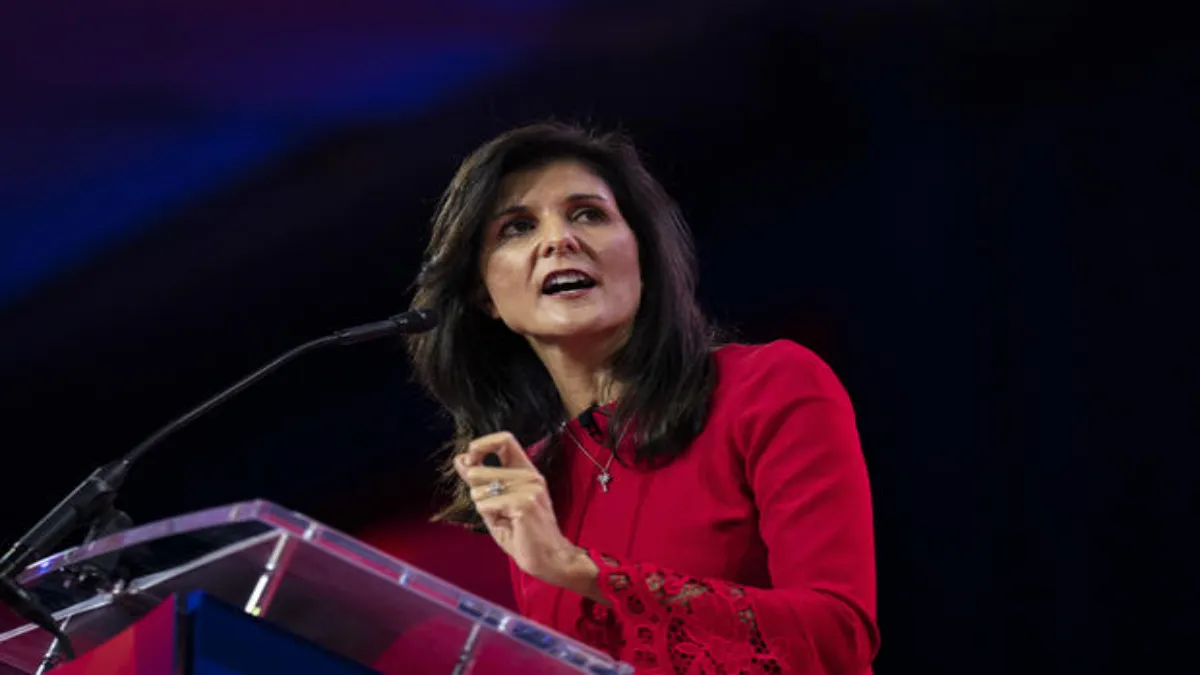As the 2024 presidential race gains momentum, the Republican field is witnessing a dynamic interplay of candidates entering, exiting, and adapting to the evolving political landscape. At the forefront of this drama is former President Donald Trump, whose legal troubles and enduring popularity shape the narrative of the GOP nomination.
Iowa Caucuses and New Hampshire Primary: Trump Dominates Despite Legal Hurdles
The Iowa caucuses marked the beginning of the nominating process, with thousands of Republicans gathering to select their preferred nominee. Former President Donald Trump emerged victorious, securing a significant lead over Florida Governor Ron DeSantis and former U.S. Ambassador to the United Nations Nikki Haley. However, Trump’s triumph is shadowed by a series of legal challenges.
Trump faced federal indictments by the Justice Department and additional charges from local prosecutors in Georgia and New York. Despite these legal headwinds, the former president maintained a stronghold on the GOP, winning the New Hampshire primary with 54% of the vote against Haley’s 43%.
The 2024 Republican Field: Trump, Haley, and the Departure of DeSantis
The 2024 Republican presidential candidates have experienced a series of shake-ups, with Trump leading the pack despite the legal cloud hovering over his campaign. The early front-runner, Trump launched his campaign in November 2022 and delivered a keynote address at the Conservative Political Action Conference (CPAC) in March 2023 after winning its straw poll.
However, Trump’s legal troubles began in March 2023 when Manhattan District Attorney Alvin Bragg indicted him on charges related to a “hush money” payment to Stormy Daniels. Subsequent federal indictments and a civil case found Trump liable for sexual abuse but not rape, adding layers of complexity to his candidacy.
Nikki Haley, the former governor of South Carolina and U.S. ambassador to the United Nations, positioned herself as a challenger to Trump, emphasizing a new generation of Republican leadership. Her proposals, including mandatory mental competency tests for politicians over 75, aimed to distinguish her from Trump and other contenders.
Florida Governor Ron DeSantis initially posed a significant challenge to Trump, launching his campaign last May with a focus on national crime rates, energy independence, and immigration. However, DeSantis exited the race on Jan. 21, just days before the New Hampshire primary, pledging support for Trump and acknowledging the former president’s continued popularity among Republican voters.
President Biden’s Bid for Reelection and the Democratic Contenders
President Joe Biden officially announced his reelection bid on April 25, 2023, emphasizing the battle for the soul of America. Biden highlighted his administration’s policy distinctions and framed the 2024 election as a choice between more or fewer freedoms, rights, and a defense of democracy. His announcement coincided with ongoing investigations into classified documents found at his former office.
The Democratic field also includes candidates such as Marianne Williamson, a spiritual adviser, and Dean Phillips, a congressman from Minnesota, offering alternative visions within the party.
Independent Candidates: Cornel West and Robert F. Kennedy Jr.
The 2024 election landscape is not limited to the two major parties, with independent candidates bringing unique perspectives. Cornel West, a progressive activist and philosophy professor, initially sought the Green Party nomination but decided to run as an independent. West’s campaign focuses on challenging both major parties on issues like Wall Street, Ukraine, and Big Tech.
Robert F. Kennedy Jr., a scion of the Kennedy family and prominent anti-vaccine activist, began his presidential run as a Democrat but shifted to an independent candidacy. Kennedy’s controversial views on vaccines and his criticism of Dr. Anthony Fauci have garnered attention, making him a distinctive figure in the independent category.
Candidates Who Have Exited the Race: DeSantis, Hutchinson, Ramaswamy, Christie, Burgum, Scott, Pence, Suarez, Hurd, and Elder
The 2024 race has seen several candidates drop out, including Ron DeSantis, Asa Hutchinson, Vivek Ramaswamy, Chris Christie, Doug Burgum, Tim Scott, Mike Pence, Francis Suarez, Will Hurd, and Larry Elder. Their reasons for withdrawal range from a lack of traction in the polls to strategic decisions aimed at consolidating party support behind specific candidates.
Notable Figures Not Running: Hogan, Pompeo, and Sununu
Former Maryland Governor Larry Hogan decided against seeking the Republican nomination, potentially impacting Trump’s path to victory. Mike Pompeo, former U.S. Secretary of State, cited unfavorable timing for his decision not to enter the race. New Hampshire Governor Chris Sununu opted out of the presidential race, emphasizing the importance of avoiding a crowded field that could inadvertently boost Trump.
As the 2024 presidential race unfolds, the dynamic interplay of legal challenges, candidate strategies, and shifting party dynamics creates a compelling political narrative. With Trump’s legal woes looming large and the field narrowing, the road to the Republican nomination remains unpredictable, ensuring that the drama of the 2024 election continues to captivate the nation.


